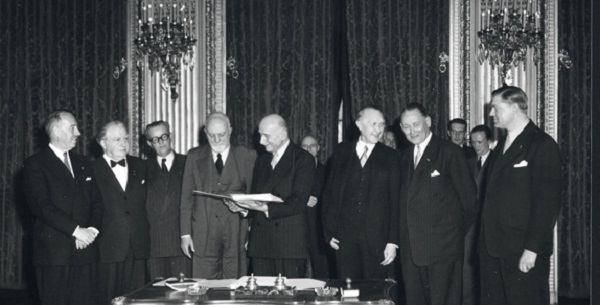 Signing of the Treaty of Paris on 18 April 1951;
Credit: European Parliament
Signing of the Treaty of Paris on 18 April 1951;
Credit: European Parliament
On Sunday 18 April 2021, European Union (EU) Foreign Ministers, including Luxembourg's Minister for Foreign and European Affairs Jean Asselborn, took part in the celebration (via video conference) of the 70th anniversary of the signing of the Treaty of Paris establishing the European Coal and Steel Community (ECSC).
70 years ago, on 18 April 1951, West Germany, France, Luxembourg, Belgium, the Netherlands and Italy signed the Treaty of Paris, thus forming the ECSC and laying the foundations for the European integration project which would become today's EU.
From 1952 to 1967, the High Authority of the ECSC had its seat in Luxembourg. Minister Jean Asselborn commented: "In Luxembourg, we are proud to have contributed our contribution to this edifice, precursor of the European Union as we know it today".
In his speech, Luxembourg's Foreign Minister recalled that the mutualisation of coal and steel finally created peace on the continent and laid the foundations for the single European market. He noted: “This single market is one of Europe's greatest achievements. Today, the free movement of goods, services and people is essential for maintaining supply chains and delivering essential goods and services to the public, including essential health care".
Minister Jean Asselborn highlighted the need to work for a more resilient single market. “This is all the more important since the latter is an essential element of industrial revival. If we want to create a more resilient and investment-friendly European economy, we need a single market allowing the development of ecological and digital solutions beyond national borders”, he said.
The meeting was also an opportunity for the six founding member states to address the challenges posed by climate change. According to Luxembourg's Foreign Minister, a strong Green Pact and an ambitious industrial strategy do not contradict one another. He also expressed the importance of combating carbon leakage, recalling that this is why Luxembourg supports the introduction of a carbon adjustment mechanism at the borders: "In its implementation, it will be necessary to work so that this mechanism effectively protects the European economy and its workers while fighting against climate change".
The COVID-19 health crisis has also highlighted the need to safeguard the European industrial tool. “70 years ago, the fathers of the ECSC understood that in order to rebuild Europe in ruins, it was essential to pool our industrial policies, in sectors of strategic importance. It is coal and steel that have made it possible to rebuild the continent”, Minister Jean Asselborn recalled. “Today, if coal is destined to disappear as a source of energy, we must spare no effort to safeguard and develop the steel industry. The European Union must not decide to depend on foreign steel if it intends to remain a strategic player”.
Luxembourg's Foreign Minister later referred to "a key element of the ECSC which created the bases necessary for European integration: the development of a spirit of cooperation and solidarity, in all areas of action of the European Union. We are all familiar with the famous 'de facto solidarity' evoked by Robert Schuman 70 years ago. This principle must also guide our actions - and above all - in times of health crisis, because a return to 'every man for himself' is now unthinkable and materially impossible”.








